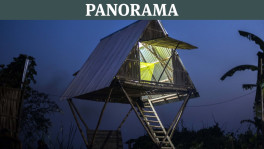How the G-7 can really end the global pandemic
The wealthy world can get Covid vaccines to the impoverished one with a cost-sharing formula modeled on UN peacekeeping

UK Prime Minister Boris Johnson has promised to vaccinate the world by the end of next year, saying it "would be the single greatest feat in medical history." Sadly, a promise is not a plan, and I fear that an initiative that appears to focus on dose-sharing by nations will fall far short of delivering the worldwide herd immunity needed to make all of us safe again.
Having attended 12 of them as prime minister or finance minister, I know how G-7 meetings work. They thrive on informality, which, of course, allows for plain speaking free of diplomatic niceties.
But open-ended conversations around a table — often without a formal agenda — can also become an excuse for inaction and avoiding difficult decisions. I can recall so many of these gatherings when the chairman sat back and simply went around the table asking each leader for his or her thoughts. When the G-7 did act, as in the 2008 financial crisis, the world benefited.
I can imagine what will happen on Friday. US President Joe Biden will say, to his credit, that he's already offered 80 million doses for developing countries, and is prepared to do hundreds of millions more. Britain, which has over-ordered vaccines, will offer 100 million doses.
Other countries will produce ambitious figures for the doses they too will hand over. They will congratulate each other on their generosity. But even an offer by the G-7 in the final communique to volunteer a billion doses — enough for 500 million adults — will not nearly be enough.
A total of 11 billion doses are needed to achieve Johnson's promise to vaccinate the world. Of the 2 billion doses already administered, 85% have gone to the richer countries. Roughly half of American adults have had at least one dose of the vaccine, and 60% in the UK, but only 1% of the world's doses have landed in sub-Saharan Africa, and only 1 in 500 of the 1 billion people there have been fully vaccinated.
African countries have now ordered 400 million one-shot doses but poorer countries face two problems that perhaps only the G-7 can solve. First, their urgent needs cannot be met if they have to wait in line this summer and autumn for leftover Western doses, most of which will not arrive until next year. And secondly, they simply cannot reach Western levels of immunization without financial support. It is not an exaggeration to say Friday's G-7 will decide who lives and who dies, who is vaccinated and safe, and who remains unvaccinated and at risk of dying.
The ACT-Accelerator Alliance, an international partnership forged in the early days of the pandemic, and Covax, its vaccination agency, provide a vehicle for the global preordering and equitable distribution of vaccines, diagnostics and therapeutics to cover the 92 poorest countries. This includes the testing and protective equipment urgently needed as countries wait for vaccines. But to bridge these agencies' huge financing gap this year, $16 billion more is needed now, and upward of $30 billion next year
Much of that money must come from the G-7. Life and death decisions cannot be left to running the G-7 like a charity fundraiser where the begging bowl is passed round. This is no substitute for a burden-sharing plan, along the lines of a proposal floated by Norway and South Africa.
That plan takes into account each country's income, wealth and the differential benefits it would receive from the reopening of the world economy. It's based on a formula similar to that once attempted for the eradication of smallpox, and used today to pay for United Nations peacekeeping. It works.
The US would pay 27%, Europe 22%, the UK 5% and Japan 6%. Canada, South Korea and Australia, 2% each. In total, the G-7 attendees would pay 67% of the total, with other G-20 countries, including China, Russia and the oil states, liable for the rest.
The world needs to create the same virtuous circle — with guaranteed funding generating new manufacturing capacity and delivering additional vaccine supply — that was done with military precision in Britain and America when they preordered vaccines months ago.
And we need a decision on Friday. In the last six months, when the vaccine was monopolized by the rich countries, 2.25 million people worldwide lost their lives, a far greater toll already than in all of 2020.
Vaccinating the world is not just an act of charity: It's in all our self-interest. Helping vaccinate the rest of the world will require the US and Europe to pay around $4 billion more this year, but a healthier populace will deliver $200 billion in additional output.
In America's case, the bill for vaccines would be less than 0.5% of the cost of its $2 trillion economic stimulus. It is the best insurance policy in the world, and in both human and economic terms the benefits far outweigh the costs.
Let's see the G-7 step up once again.
Gordon Brown is the UN special envoy for global education. He served as the UK's prime minister from 2007 to 2010 and chancellor of the exchequer from 1997 to 2007. He is the author of "Seven Ways to Change the World"
Disclaimer: This article first appeared on Bloomberg, and is published by special syndication arrangement.


 Keep updated, follow The Business Standard's Google news channel
Keep updated, follow The Business Standard's Google news channel
















